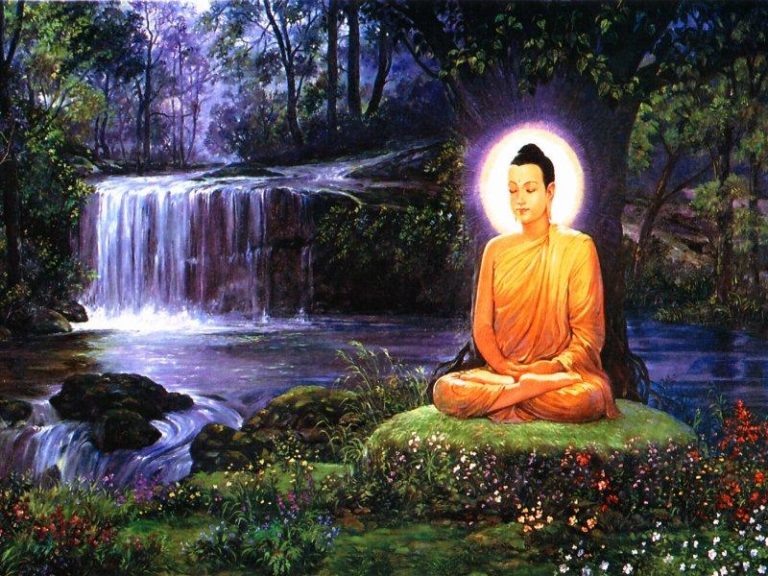
I believe that the Buddha had an issue with food. In his attempt to become enlightened, legend has it that he fasted for 40 days and became so thin that he almost died. A woman passing by where he was mediating saw him and was concerned, fearing for his life. She happened to have a bowl of rice-pudding with her, and offered it to him. He received her spirit of simple and genuine kindness, and could come back from his self-imposed brink of death. In that moment, he decided to break his fast and receive her life-bringing offering of health.
At the exact moment that he took the bite, a boat floated down the river next to him, carrying a man playing a three-stringed instrument. Legend has it that the one string was too tight and made an ugly twang, one was too loose and sounded so baggy and flat little sound was made, while the third string was perfectly strung and tuned, and therefore sent out beautiful and resonant waves.
The combination of these two events provided the “penny dropping” that sent the Buddha into his realisation of Truth. He saw how extreme he’d been around food, almost killing himself through self-deprivation. Finally being willing to receive the nourishment his body needed gave him the ‘aha’ moment that finding balance around food – the middle way – was far more effective to bring him enlightenment than through the extreme parts of himself (before his ascetic spiritual seeking the Buddha had lived a prince, a life which included much luxury even over-indulgence).
The sound of the perfectly-tuned string represented for the Buddha the dynamic balance that could support him and others in all our quests for truth and wellbeing in our lives. And I believe it provides a metaphor for overcoming our issues with food.
We might consider the over-strung string the dieting part of ourselves – rigid and tightly-controlling of our food and weight. The effect of living from this part of ourselves is that we become tense and anxious, obsessed with perfection and following self-imposed rules we believe will help us achieve perfection.
On the other hand, the loose and baggy string could be likened to the more indulgent part of ourselves, that has us eat what we want, when we want, even if this is costly to our health, focus, and inner-peace. This part of us often rejects wholesome and loving routines or boundaries, and the effect of this is that we are left feeling uncomfortable about ourselves, distracted from our focus and clarity, restlessly seeking out that next bite, and ever swinging back to the opposite extreme in an attempt to ‘get back in shape’ or ‘sort ourselves out’.
The Buddha summarised his enlightenment experience as ‘Finding the Middle Way’. I believe that each person who suffers with a habit of overeating and self-criticism about it, and with patterns of restrictive dieting to compensate for it, requires their own ‘enlightenment’ experiences to be free. I believe such experiences – however large or small – add up to the discovery and formation of our own unique ‘middle way’ around food and our bodies.
I invite you to journal about what ‘the middle way’ might look like for you. Are there extremes you’ve experienced around food or not-eating? How did living from these extremes leave you feeling, physically, mentally, emotionally, and spiritually? Jot down anything that comes to mind, in a spirit of curiosity and kindness.
As a therapist and mentor who facilitates and supports people to discover their own freeing and life-enhancing middle-way around food, I’ve discovered something common to us all: discovering our middle way comes from us. It comes from our own intuition and unique series of ‘aha’ moments about what will suit us, our lifestyles, our bodies, and the way we interact with the world around us. My role is as a loving witness, and, if required, guide: holding the torch as the exploration and internal ‘dig-for-gold’ takes place.
I believe the process of discovering your own Middle Way with food can start for you today, if you wish. Recognising your own extremes around food – and identifying where they may have led in the past – offers a helpful framework within which to explore how you wish to live out your food-life today.
You may wish to journal a little about your past with food, in service of getting to better know any more extreme-around-food parts of yourself. Be a kindly and curious ‘Oprah’ in the interviewer seat, finding out more about any restrictive, dieting parts of you, or any over-indulgent food parts. See if these parts of you would be willing to share more about their roles within you: what motivates their actions, and their feelings, beliefs and goals for you.
In order to embrace his new enlightened view of life, the Buddha needed to release his life-long burden of believing he wasn’t worthy of this massive and magical change. Notice where similar feelings of unworthiness arise as you connect with your own food parts, in the spirit of discovery. You may notice whispers of unworthiness – unworthy of being healthy, happy, and free – beneath the surface of your own relationship with food.
I invite you to slow down and take time with this process of discovery … to be the witness of all that arises within you as you explore your own relationship with food, embracing all that you find gently within the larger, kindly container that you are.
